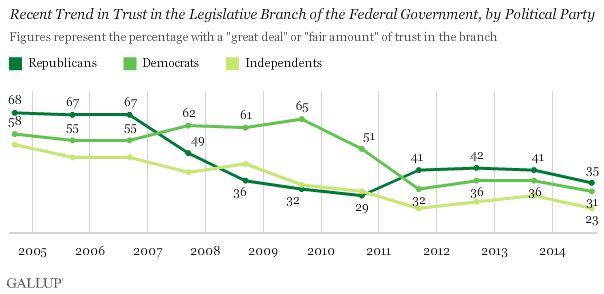50 Days Ahead of Election, Trust in Congress Hits Historic-Low

With less than 50 days before Election Day, Gallup published a report on Monday that shows that public trust in the federal government continues to decline. According to the most recent survey, 28 percent of respondents said they trust the Legislative Branch a "great deal" or "fair amount."
Additionally, 43 percent said they trust the Executive Branch, and the Judiciary Branch remains the most trusted branch of the government at 61 percent.
Historically, respondents have been more likely to say they don't trust the Legislative Branch than the other two branches of government. However, trust in Congress dropped to historic lows in 2011 when it fell to 31 percent, picked up a little bit in 2012 and 2013, and has since dropped to a new record-low.
According to Gallup, since 2005, respondents who claim no affiliation to either major party have been least likely to trust Congress and as partisanship has gotten worse, trust among this demographic has declined even more. Twenty-three percent of independent respondents said they trust the Legislative Branch a "great deal" or a "fair amount."

The survey-takers who identify as independent tend not to care which party is in control, because Congress has become less and less representative of the American public. Partisan gridlock has prevented meaningful legislation from being passed and when bipartisan compromise is reached, it is more for grandstanding than solving problems.
The lack of adequate representation in the Legislative Branch is a result of over 200 years of gerrymandering, as well as election laws designed to limit competition in elections and prevent millions of voters from having equal access to all integral stages of the voting process.
Given the latest data on the public opinion of Congress, most independent voters will likely agree that not much will change after the 2014 elections.


